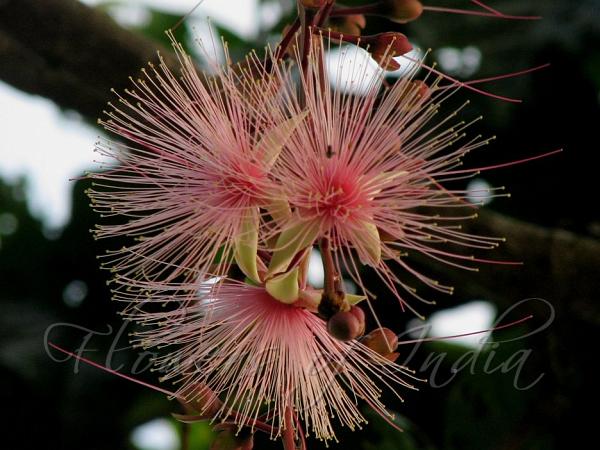|
| Powderpuff Mangrove |
|

|

| File size | 134753 |
| Original date | 12/22/10 6:08 AM |
| Resolution | 936 x 702 |
| Flash | Flash did not fire, auto |
| Focal length | 57.8mm |
| Exposure time | 1/125s |
| Aperture | 3.5 |
| Focus Distance | |
| Metering Mode | Multi-segment |
| Camera make | Canon |
| Camera model | Canon PowerShot S5 IS |
| Sensor type | OneChipColorArea |
|
|
|
|
Photo: |
Botanical name: Barringtonia racemosa Family: Lecythidaceae (Brazilnut family)
Synonyms: Eugenia racemosa
Synonyms: Eugenia racemosa
Powderpuff Mangrove is a beautiful mangrove tree, easily recognized by its
large leaves, delicate pinkish or white flowers and guava-like fruit that
hang in long racemes. It has a straight, unbranched stem that leads to a
rounded crown and is usually 4-8 m tall, but occasionally reaches 15 m.
The bark is grayish brown to pink with white blotches and raised dots and
lines. The branches are marked with leaf scars. Alternately arranged
leaves are clustered at the ends of branches. They are obovate, 18-32 cm
long, 5.5-14.5 cm broad, with leaf-stalks 0.5-1.2 cm long. The midribs are
prominent on the lower side of the leaf and the branching veins are
visible on both sides. Showy flowers are produced on hanging racemes up to
1 m long. The buds are pinkish red and split open to bring forth masses of
delicate stamens in pink to white sprays, up to 3.5 cm wide. The flowers
give off a pungent, putrid yet faintly sweet odor in the morning. The
fruit are quadrangular, 6.5 x 4 cm. Each fruit contains a single seed
surrounded by spongy, fibrous flesh that provides the buoyancy that allows
the fruit to be carried off with the tide. Powderpuff Mangrove is globally
distributed from East Africa to West Pacific. Within India, it has been
recorded in west coast from Konkan southwards through Karnataka, Kerala,
Tamil Nadu often planted as ornamental. It is also found in Sundarbans and
in the Andamans.
| Identification credit: Prashant Awale | Photographed enroute to Baratang, Andaman & Nicobar. |
• Is this flower misidentified? If yes,